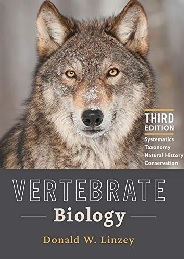Vertebrate Biology: Systematics, Taxonomy, Natural History, and Conservation (Third Edition)

Donald W. Linzey
John Hopkins University Press, £92.50
This latest edition of Donald Linzey’s popular vertebrate textbook is squarely aimed at undergraduate students and their educators. The text is accessibly readable, while still robust with detail, clearly set out and copiously well illustrated, including, for this edition, a set of full colour plates. Each chapter ends with a series of review questions, as well as a detailed list of supplementary reading, including websites.
Chapters cover topics such as: vertebrate evolution and systematics; the different vertebrate classes, including their morphology, reproduction and development; zoogeography; population dynamics; migration and other types of movement; intraspecific behaviour and ecology; interspecific interactions; extinction; techniques for ecological and behavioural studies. In this new edition, chapters have been included on issues relating to the increasing impact of humans on vertebrates, covering topics such as climate change, conservation, legislation and wildlife management. There are appendices describing vertebrate classification and endangered species (although the latter does focus on US species), as well as a glossary and expansive bibliography.
The book will provide a solid foundation for students of the biological sciences, whether their course is based on vertebrate biology itself, or on broader fields such as ecology or wildlife management. It will also appeal to their teachers, as well as researchers looking beyond their immediate area of specialism. Many of the examples in the book are from the US, reflecting no doubt the interests and expertise of the author, a faculty member in the Department of Fish and Wildlife Conservation at Virginia Tech, however, other relevant examples from around the world are also referenced.
Although written primarily for students, there is much to commend this book to anyone with an interest in vertebrates, zoology or natural history.
Mike Smith FRSB


